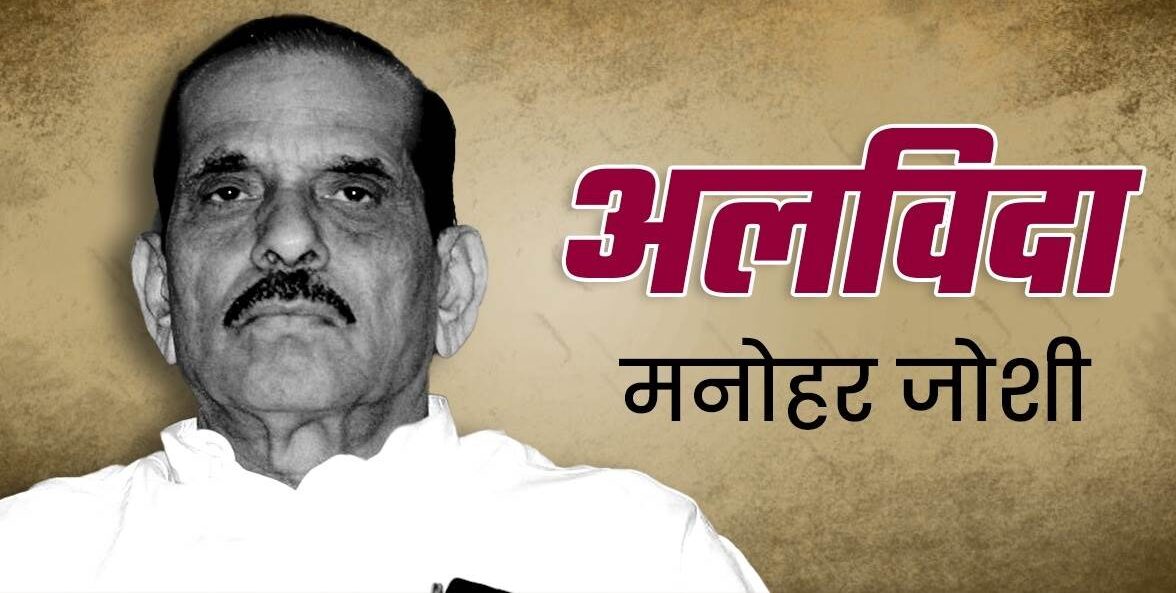Manohar Joshi, former Maharashtra CM
Former Chief Minister of Maharashtra, Manohar Joshi, aged 86, passed away on February 23 in mumbai following an extended period of age-related health complications.
Manohar Joshi was admitted to the Intensive Care Unit (ICU) at Hinduja Hospital on February 21, according to the private medical facility. He passed away early on Friday, around 3 am.

Manohar Joshi, the former Maharashtra chief minister and Lok Sabha speaker, passed away in Mumbai at the age of 86 after battling a prolonged illness. He commenced his political journey by chauffeuring a young Bal Thackeray to various political gatherings in his car. However, it was Joshi’s shrewdness, skill in forging political agreements, and unwavering loyalty to the Shiv Sena founder that paved the way for his numerous accomplishments.
MANOHAR JOSHI :
Hailing from the Maharashtrian Brahmin community in Konkan, Joshi initially moved to Mumbai to work as a teacher in a coaching class. From there, he ventured into establishing his own multi-crore technical education institute, later expanding into real estate and hospitality. Known for his soft-spoken nature and adept political management skills, Joshi complemented the more charismatic and aggressive Bal Thackeray perfectly.
Joshi played a pivotal role in the Shiv Sena’s control of the influential Bombay Municipal Corporation in the early 1970s. His steady ascent within the party ranks saw him serve as the mayor of Bombay, followed by the leader of the opposition in the Maharashtra Assembly, culminating in his appointment as chief minister of the first Shiv Sena-BJP government in Maharashtra in 1995. Despite Thackeray’s public declaration that he held the reins of power in the state, Joshi’s tenure as CM showcased the Shiv Sena’s governance capabilities.
Despite his close association with Thackeray, Manohar Joshi wasn’t initially Thackeray’s preferred choice for chief minister. The Shiv Sena founder, buoyed by the Hindutva movement following the Babri Masjid demolition, initially favoured another colleague, the mild-mannered Sudhir Joshi, for the position. However, Thackeray was cautioned that Sudhir Joshi might struggle to manage a robust ally like the BJP and the support of 32 independent MLAs.
According to a senior Sena leader, “It was likely the first government of its kind in Maharashtra, where the entire cabinet, including the chief minister, had no prior government experience. It was solely Manohar Joshi’s expertise that ensured the smooth functioning and stability of the government.” Eknath Khadse, who served as finance and irrigation minister in Joshi’s cabinet, commented, “We may have had disagreements, but he was always receptive to our suggestions. Once our ideas were accepted, he fully supported us.”

Navigating the challenges posed by a formidable ally like the BJP and a demanding leader like Thackeray demanded a delicate balance, in which Joshi proved to be quite skilled, according to political analyst Pratap Asbe. However, Joshi’s tenure as CM was not without controversy. Allegations of corruption surfaced following scrutiny from Anna Hazare, followed by Justice BN Srikrishna’s damning report on the 1992-1993 communal riots in Bombay, and the Enron power project debacle, which kept Joshi under pressure.
Despite these challenges, Joshi’s term witnessed significant infrastructure development in Maharashtra. His administration initiated the construction of 55 flyovers in Mumbai, launched the Mumbai-Pune expressway, the Krishna Valley irrigation project, and a contentious slum rehabilitation scheme.
However, Joshi faced internal strife within his own party. His relationship with Thackeray soured within three years of assuming office. The 1998 Lok Sabha elections proved to be a turning point for Joshi when Sharad Pawar, then with the Congress, forged a coalition of opposition parties that secured 38 out of 48 seats in Maharashtra. Thackeray and Pramod Mahajan, the architect of the saffron alliance, believed a change in leadership was necessary. The BJP also convinced Thackeray that a Maratha chief minister was needed as the influential community seemed to favour the Congress. Consequently, Thackeray replaced Joshi with Narayan Rane in February
